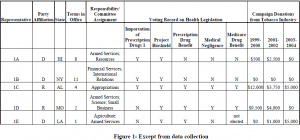Jordana R. Choucair and Dr. Michael Barnes: Health Sciences
Each year, 440,000 American lives are claimed by smoking-related diseases.1 The economic costs of smoking are astronomical. Smoking costs the United States over $150 billion each year in health-care costs including $81.9 billion in mortality-related productivity loses and $75.5 billion in excess medical expenditures.2 Furthermore, secondhand smoke is responsible for approximately 3,000 lung cancer deaths annually in U.S. nonsmokers.3 However, tobacco does not only affect those who smoke and inhale cigarette carcinogens, tobacco affects all Americans due to the influence the tobacco industry has in politics.
The primary objective of this study was to determine the tobacco industry’s influence on health legislation since the 2000 election cycle. This determination was made by tracking and recording data in the following manner: Representative (Senate and House), Political Party, years in office, State the represent, Responsibility/ committee positions, voting record on health legislation (specifically dealing with tobacco), and campaign donations from the tobacco industry. This portion of the study proved to be the most difficult. The individual information on each legislator was readily available, but the voting information and campaign donation collection was somewhat harder to find. After the data was gathered, it was analyzed to determine any relationships between the political voting record and campaign donations from the Tobacco industry. This information was coded in the following manner: a specific bill relating to health legislation was obtained and the individual vote from each representative was recorded. This was then cross-examined with how much campaign money they received from the tobacco industry, how long they have been in office, etc. See figure 1 for an excerpt of the data collection portion of the study.
My initial hypothesis in approaching this research was that an individual receiving large contributions from the tobacco company would vote against legislation having a negative effect on the tobacco industry. Past research had several indications that this was the case, and I was hopeful that the same sentiments towards the tobacco industry were still in effect.
Findings
In 1996, the tobacco industry contributed over $10 million to national political parties and was also “ranked among the biggest abusers of the soft money loopholes in the 1996 elections”4. Moreover, almost “3 out of four current Congress members accepted tobacco industry PAC contributions during the 10-year period from 1987 to 1996″5 – the leading recipient of these funds was Representative Thomas Bliley, who has tremendous influence over tobacco-related legislation in the House.
Since then, the tobacco industry contributions to national political parties have dropped by approximately $2 million. (See Figure 2 6). Whether or not their influence on tobacco-specific legislation has dropped also is difficult to tell, at least on a national level, due to little national legislative activity on the issue. However, a closer look at past numbers indicate that when faced with a bill that could fundamentally alter their industry, tobacco companies dramatically step up their lobbying spending. For example, industry spending on lobbying increased 1.8 times, to $67.4 million in 1998 from $38.2 million in 1997.7 That moved the tobacco industry from eighth place in 1997 to fourth place in 1998. British American Tobacco (parent company of Brown & Williamson Tobacco Corp.), which spent $4 million on lobbying in 1997 and ranked 54th, increased its lobbying expenditures six-fold in 1998, to vault to No. 1 among all spenders at $25 million.8 Likewise, Philip Morris made 63 percent of its lobbying expenditures for the year during the first six months of 1998, when the industry succeeded in scuttling the antismoking bill that Sen. John McCain (R-Ariz.) was pushing.9
Conclusion
When I began this research project, I had no idea how detailed and time-consuming it would be. I spent all summer and most of the fall gathering data, before beginning the analysis portion of this study. There have definitely been frustrating moments, mainly with finding accurate data and attempting to show a correlation between voting records and tobacco donations to political campaigns. In recent months, I have been introduced to another facet of this correlation – the influence the tobacco industry has on health legislation on a state level. For instance, Gov. Jim Hodges (SC) recently squashed a modest cigarette tax increase that would have saved health care programs for the poor without endangering other government services. There is reason to believe that his primary motive was the fear of wrath from the tobacco companies from which he has received $75,000 for his lottery campaign and $21,000 for his re-election bid. South Carolina is one of just three states where political parties can collect unlimited donations and hide the donors’ names from the public, so whether or not more funds have been received is unknown. 10 I plan to begin collecting and analyzing this data within the upcoming months and am hopeful that a correlation will be found within state data.

Works Cited
- American Lung Association Smoking Fact Sheet. Retrieved from www.lungusa.org/tobacco/smoking_factsheet99.html on October 15, 2003.
- American Lung Association Smoking Fact Sheet. Retrieved from www.lungusa.org/tobacco/smoking_factsheet99.html on October 15, 2003.
- American Lung Association Smoking Fact Sheet. Retrieved from www.lungusa.org/tobacco/smoking_factsheet99.html on October 15, 2003.
- www.commoncause.org
- www.commoncause.org
- www.commoncause.org
- Tobacco Money Continues Its Death Grip on Washington Industry’s Biggest PAC & Soft Money Beneficiaries In The Senate Kill Tobacco Legislation. Friday, June 19, 1998. Retrieve from http://www.commoncause.org/publications/062098.htm on November 24, 2003.
- Tobacco Money Continues Its Death Grip on Washington Industry’s Biggest PAC & Soft Money Beneficiaries In The Senate Kill Tobacco Legislation. Friday, June 19, 1998. Retrieve from http://www.commoncause.org/publications/062098.htm on November 24, 2003.
- Tobacco Money Continues Its Death Grip on Washington Industry’s Biggest PAC & Soft Money Beneficiaries In The Senate Kill Tobacco Legislation. Friday, June 19, 1998. Retrieve from http://www.commoncause.org/publications/062098.htm on November 24, 2003.
- Tobacco donations highlight need for campaign reform. The State: South Carolina’s homepage. Retrieved from http://www.thestate.com/mld/state/news/opinion/3120765.htm) on January 30, 2004.

